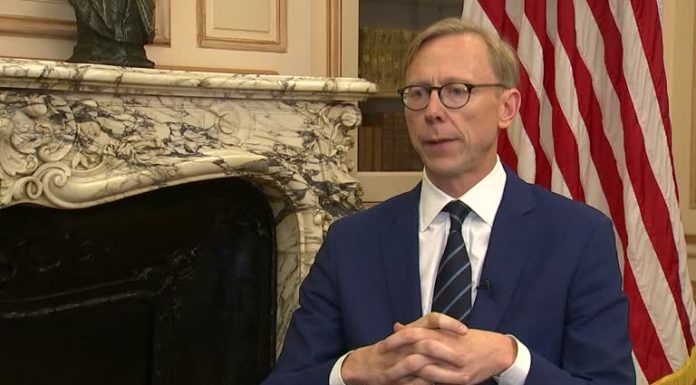By John Irish
PARIS, June 27 (Reuters) – The U.S. policy of maximum economic pressure on Tehran is working but the sanctions do not give Iran the right to breach its nuclear commitments, a senior U.S. official said on Monday.
U.S. Special Representative on Iran Brian Hook was speaking in an interview before a meeting with senior French, British and German diplomats in Paris to convince them that the Trump administration’s policy of crippling sanctions was the best way to get Iran back to the negotiating table.
“We are dedicated to this policy of maximum economic pressure because it is working, it is denying the regime historic levels of revenue,” Hook told Reuters.
The meeting also comes with Iran on course to reach that limit of the maximum amount of enriched uranium it is allowed to have under a 2015 nuclear deal that includes the three European powers, Russia and China.
When asked about Iran possibly breaching those restrictions, Hook said it was clear there would be consequences and that despite the U.S. pullout from the accord in 2018 and subsequent sanctions, it was not an excuse to violate the accord.
“Our sanctions do not give Iran the right to accelerate its nuclear programme. It can never get near a nuclear bomb. We are looking very closely at that so it doesn’t get below the one-year nuclear break-out time.”
Hook said he would share his views in Paris on Iran‘s “nuclear blackmail.”
The deal is meant to extend the time Iran would need to make an atomic bomb, if it chose to, to a year from some 2-3 months.
President Donald Trump withdrew the United States from the 2015 pact last year under which Iran accepted curbs on its nuclear programme in return for a removal of sanctions. Iran as said it wants to abide by the deal but cannot do so indefinitely as new U.S. sanctions mean it is receiving none of the benefits.
The European powers are scrambling to protect trade with Iran but what they can achieve pales in comparison to U.S. sanctions aimed at slashing Iran‘s vital oil exports to zero.
But the escalating crisis has put the United States in the position of demanding its European allies enforce Iranian compliance with an accord Washington itself rejects.
France said it would ask Trump to suspend some sanctions on Iran to make room for negotiations to defuse the escalating confrontation between Washington and Tehran.
Hook said Tehran had spurned U.S. advances about talks.
“We’ve offered many carrots and a year ago we made clear that if Iran behaves like a normal nation and not a revolutionary cause then we will lift all our sanctions.”
The Trump administration says its ultimate goal is to force Iran back to the table for negotiations. It argues that the 2015 deal, negotiated under Trump’s predecessor Barack Obama, was too weak because it is not permanent and does not cover non-nuclear issues, such as Iran‘s missile programme and regional behaviour.
(Reporting by John Irish Editing by Richard Lough, Leigh Thomas and Mark Heinrich)


